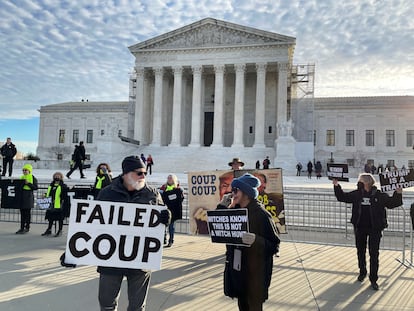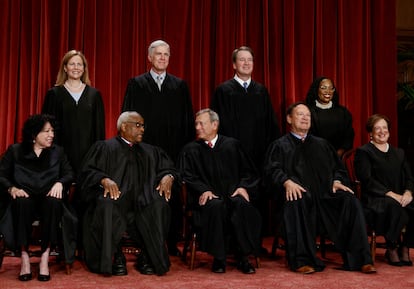Supreme Court appears to lean toward allowing Donald Trump to run for office
The justices must rule on whether to uphold or overturn Colorado’s decision to exclude him from the state’s ballot for having participated in an insurrection

Whether or not Donald Trump can return to the White House and, before that, whether he can even run for office depends on how a convoluted 95-word sentence is interpreted. This Thursday, the meaning of that sentence, tucked away in the third clause of the 14th Amendment to the U.S. Constitution, was debated for more than two hours in oral arguments before the U.S. Supreme Court. The justices are expected to rule in the coming weeks. Not being able to draw definitive conclusions ahead of their ruling, their interventions suggest they are mostly inclined to let Trump run for office. Of the nine justices, six are conservative (three of them appointed by Trump himself) and three are progressive.
Thursday’s hearing clearly showed that the clause in question, Section 3 of the 14th Amendment, which regulates disqualification for insurrection, leaves more doubts than certainties. It is not clear who applies it, how it is applied, when it is applied or to whom it is applied. All of these questions led to various debates in this morning’s session.
The justices must rule specifically on the Colorado Supreme Court ruling that disqualified Trump from running in the state’s primary next March 5, which is why their decision is expected sooner rather than later. Beyond Colorado, the Supreme Court’s decision will have repercussions in dozens of states. In Maine, a similar disqualification of Trump is on hold pending what the high court says. The Supreme Court has not played a similar role in electoral matters since Bush v. Gore, which settled the Florida recount dispute in the 2000 election and ultimately gave the presidency to George W. Bush.
Trump’s lawyer, Jonathan Mitchell, argued that the constitutional amendment does not prevent anyone from running for election, but rather from “holding” office. The rule also allows Congress, by a two-thirds majority of each house, to lift the disqualification, but that provision would not make much sense if a candidate is not even allowed to be elected. “We don’t know whether President Trump will be excused before he’s sworn in, if he wins the election, on January 20th, 2025,” Mitchell argued. Several justices appeared receptive to that argument. “Section 3 refers to the holding of office, not running for office,” conservative justice Samuel Alito said.
Mitchell also argued that it is not a clause intended for the presidency, since it states that an insurrectionist may not be “a Senator or Representative in Congress, or elector of President and Vice-President, or hold any office, civil or military,” in what appears to be a descending order and in which the president is not mentioned. And that, in this case, the word “office” does not include the presidency.
It is also unclear whether this is a “self-executing” rule or whether it has to be enforced by Congress, nor whether it is for Congress to establish whether someone has participated in an insurrection.

Trump’s defense also argued that the clause applies to anyone who has participated in an insurrection while being an “officer of the United States,” a term that, according to the former president’s team’s interpretation, does not apply to the president himself. His defense argued that the term appears in three other constitutional provisions, all of which exclude the president from its scope.
Getting down to the detail of the phrase, another of Trump’s legal team’s arguments is that upon taking office he did not take an oath to “support” the Constitution, but that the president’s oath is to “preserve, protect, and defend” the Constitution. It further points out that he did not take that oath as an “officer of the United States,” which would also exclude him from the clause in question.
Moreover, Trump’s defense argued that the events of January 6, 2021, were not an insurrection in the sense in which that term is used in Section 3 of the 14th Amendment. Rather, Mitchell argued that the attack on the U.S. Capitol was part of a long history of political protests that have become violent in the United States. As Trump’s lawyer said Thursday, what happened that day was a “riot, not an insurrection,” since an insurrection would require an organized, concerted and violent attempt to overthrow the government — an argument that did appear to convince progressive judge Ketanji Brown Jackson.
According to Mitchell, even if those acts were considered an insurrection, the then-president would not have participated in it. And that in any case, the disqualification would only apply to someone convicted, not merely accused.
Regardless, not much time was spent on analyzing whether the assault on the Capitol was an insurrection and whether Trump took part in it. That reinforces the idea that the justices will resolve the issue by looking at the strictly legal merits of the case, without getting into political appreciations, such as whether what happened on January 6 can be considered a failed coup attempt. The Colorado Supreme Court, for its part, interpreted the findings of the U.S. House committee that investigated the January 6 attack as sufficient evidence that Trump is an insurrectionist.
The one who did get right to the heart of the matter was Jason Murray, the attorney representing Colorado voters who have challenged Trump’s participation in that state’s primary. “We are here because for the first time since the War of 1812, our nation’s capital came under violent assault. For the first time in history. The attack was incited by a sitting president of the United States to disrupt the peaceful transfer of presidential power,” he said Thursday. “By engaging in insurrection against the Constitution, President Trump disqualified himself from public office. As we heard earlier, President Trump’s main argument is that this Court should create a special exemption to Section 3 that would apply to him and to him alone. He says Section3 disqualifies all oath breaking insurrectionists except a former president who never before held other state or federal office. There is no possible rationale for such an exemption and the court should reject the claim that the framers made an extraordinary mistake,” he added.
However, both Samuel Alito and Neil Gorsuch, both conservatives, pressed back at Murray by pointing out the possible consequences of letting different states establish their criteria for whether a candidate has participated in an insurrection and whether he or she should be disqualified from running for office. Chief Justice John Roberts suggested the possibility that if Colorado is allowed to remove Trump from the ballot, perhaps other states will choose to veto President Joe Biden. Progressive Elena Kagan also seemed uncomfortable with the possibility of letting each state decide as it sees fit.
Colorado Attorney General Senior Staff defended her state’s court decision. “The petitioner contends that Colorado must put him on the ballot because of the possibility there would be a supermajority act of Congress to remove his legal disability. Under this theory, Colorado and every other state would have to indulge this possibility, not just for the primary, but through the general election and up to the moment that an ineligible candidate was sworn into office. Nothing in the Constitution strips the states of their power to direct presidential elections in this way,” she said.
The first sentence of Section 3 of the 14th Amendment reads: “No person shall be a Senator or Representative in Congress, or elector of President and Vice-President, or hold any office, civil or military, under the United States, or under any State, who, having previously taken an oath, as a member of Congress, or as an officer of the United States, or as a member of any State legislature, or as an executive or judicial officer of any State, to support the Constitution of the United States, shall have engaged in insurrection or rebellion against the same, or given aid or comfort to the enemies thereof.”
Sign up for our weekly newsletter to get more English-language news coverage from EL PAÍS USA Edition
Tu suscripción se está usando en otro dispositivo
¿Quieres añadir otro usuario a tu suscripción?
Si continúas leyendo en este dispositivo, no se podrá leer en el otro.
FlechaTu suscripción se está usando en otro dispositivo y solo puedes acceder a EL PAÍS desde un dispositivo a la vez.
Si quieres compartir tu cuenta, cambia tu suscripción a la modalidad Premium, así podrás añadir otro usuario. Cada uno accederá con su propia cuenta de email, lo que os permitirá personalizar vuestra experiencia en EL PAÍS.
¿Tienes una suscripción de empresa? Accede aquí para contratar más cuentas.
En el caso de no saber quién está usando tu cuenta, te recomendamos cambiar tu contraseña aquí.
Si decides continuar compartiendo tu cuenta, este mensaje se mostrará en tu dispositivo y en el de la otra persona que está usando tu cuenta de forma indefinida, afectando a tu experiencia de lectura. Puedes consultar aquí los términos y condiciones de la suscripción digital.








































